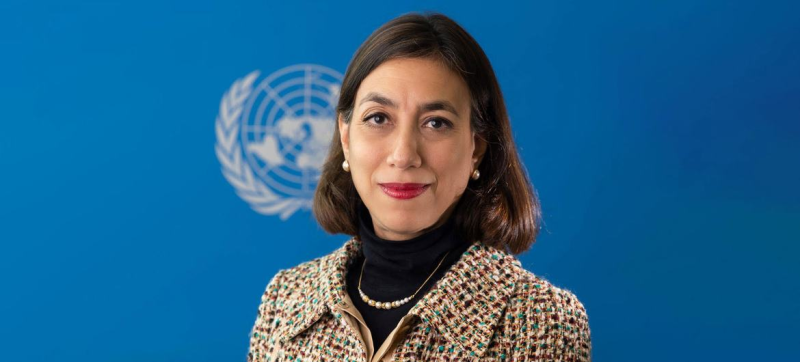- WHO Says Traditional Medicine Use Surges Worldwide |
- UN Report Calls for New Thinking to Secure a Sustainable Future |
- BNP moves to finalise seat sharing as alliance friction grows |
- BNP plans universal 'Family Card' for all women: Tarique Rahman |
- Tangail saree weaving gets recognition as intangible cultural heritage |
Gender Equality Seen as Key to Building Lasting Peace

Laura Flores, Americas Division Director, Department of Political and Peacebuilding Affairs.
Twenty-five years ago, the international community adopted a transformative approach to women’s inclusion in peace processes, known as the Women, Peace and Security (WPS) Agenda, outlined in the landmark Security Council Resolution 1325.
The resolution “was a real game-changer,” said Laura Flores, Americas Division Director at the Department of Political and Peacebuilding Affairs (DPPA), in an interview with UN News.
Leading the department’s initiatives in Latin America and the Caribbean, she works closely with local authorities, organisations, and women’s and Indigenous communities to advance gender equality.
“People finally started recognising that women aren’t just affected by conflict — they’re also key to resolving it,” Ms. Flores said. “It’s about ensuring women have a seat at the table when peace is negotiated and that their voices are heard in decisions that shape recovery and security.”
Record-setting representation
Last year, nearly 700 million women lived within 50 km of deadly conflict, according to the UN Secretary-General’s report on Women, Peace and Security. Sexual violence increased by 87 per cent over the past two years, while nine out of ten peace processes excluded women negotiators.
Yet the 25th anniversary of the WPS Agenda serves as a reminder of progress achieved. The Americas region recorded the highest average of women in parliament globally — with Caribbean countries averaging 41 per cent, South America 31.9 per cent, and Central America 30.8 per cent.
Countries such as Mexico, Chile, and Colombia have also adopted foreign policies promoting gender equality in diplomacy, peacebuilding, and development.
“These policies are still new and will need strong support and coordination to take root, but they’re a sign of progress,” Ms. Flores said.
Regional strengths, ongoing challenges
The UN promotes women’s protection in conflict and participation in peace negotiations, but it is up to national governments to implement WPS principles in their policies.
In Chile, the UN assisted a presidential commission addressing the root causes of conflict affecting Indigenous communities, particularly those impacting Mapuche women. Most of the commission’s proposals came directly from women.
Last year, Ms. Flores’s department helped Colombia develop its first national action plan aligned with Resolution 1325. Meanwhile, in Haiti, DPPA works with UN Women to support survivors of gender-based violence.
However, gender-based violence in the region remains “alarmingly high,” with at least 11 women murdered every day in Latin America, Ms. Flores said. Political violence and online harassment targeting women leaders are also rising, while in countries like Haiti, women’s political participation remains low amid high levels of sexual violence.
“The region has momentum, but it needs protection, investment, and political will to keep moving forward,” Ms. Flores emphasised.
Moving forward, hand in hand
Indigenous Peoples, who make up over 467 million of the global population, are often denied the right to live in accordance with their cultural values and face exclusion from political processes.
“Indigenous women are often hit hardest by conflict, but they’re also incredibly resilient and central to peace efforts,” Ms. Flores said.
One such leader is Otilia Lux de Cotí, an Indigenous Maya K’iche’ woman who served as a government minister in Guatemala in 2000. She played a crucial role in documenting the specific forms of violence endured by women and Indigenous Peoples during the country’s civil conflict.
“I am the daughter of Guatemala’s war,” Ms. Lux said in an interview. More than 200,000 lives were lost in the conflict, which began in 1962 and lasted for three decades. Since the 1996 peace agreement, women have driven much of the progress in advancing rights and democracy.
“More recently, Indigenous women authorities have played pivotal roles in defending democracy, particularly during the 2023 elections, when the peaceful transfer of power was at risk,” Ms. Flores said.
During the crisis, Guatemala’s Indigenous Peoples raised their varas — ancestral staffs symbolising traditional authority — in defence of their vote.
“The decision to act did not happen overnight; it followed long discussions within our communities. We call this process Yacataj in K’iche’ — a collective awakening of consciousness,” Ms. Lux explained.
“That moment, when our ancestral symbols were raised, was not simply a protest; it was an act of democratic participation seen through Indigenous eyes,” she added.
Just as Resolution 1325 urged countries to “ensure increased representation of women at all decision-making levels” in preventing and resolving conflict, women like Ms. Lux continue to strengthen democracy by refusing to stay silent.

